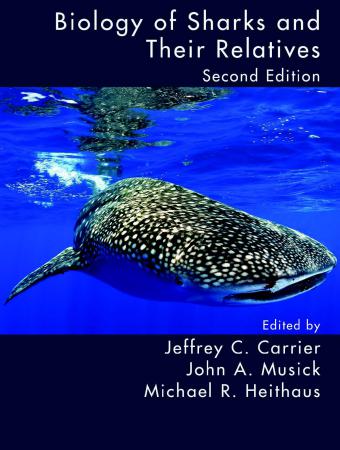Virtually every area of research associated with sharks and their relatives has been strongly impacted by the revolutionary growth in
 technology. The questions we can now ask are very different than those reported even two decades ago. Modern immunological and genetic techniques, satellite telemetry and archival tagging, modern phylogenetic analysis, GIS, and bomb dating, are just a few of the techniques and procedures that have become a part of our investigative lexicon.
technology. The questions we can now ask are very different than those reported even two decades ago. Modern immunological and genetic techniques, satellite telemetry and archival tagging, modern phylogenetic analysis, GIS, and bomb dating, are just a few of the techniques and procedures that have become a part of our investigative lexicon.
A modern synthesis of the biology of Chondrichthyans, Biology of Sharks and Their Relatives, Second Edition discusses significant advances in the development and application of new molecular techniques to the understanding of the phylogenetic relationships among and between these groups. The book considers the effect of global changes on the status of sharks and their relatives, and how advances in technology and analytical techniques have changed not only how we approach problem solving and scientific investigations, but how we formulate questions. The book also introduces applications of new and novel laboratory devices, techniques, and field instruments.
This second edition of the award winning and groundbreaking original exploration of the fundamental elements of the taxonomy, systematics, physiology, and ecology of sharks, skates, rays, and chimera, presents cohesive and integrated coverage of key topics and discusses technological advances used in modern shark research. Offering a well-rounded picture for students and researchers, and far above competitors in scope and research, this new volume holds a wealth of data on the current status of Chondrichthyan research and provides the basis and springboard for original research.
The new-and-improved second edition of this excellent series contains the latest information about many aspects of shark research. Additionally, the book contains several brand-new chapters focusing on how improved technology (molecular/genetic methods as well as satellite and acoustic tracking) has affected shark research. As with the first edition, this volume primarily focuses on 3 broad sections of elasmobranch research: phylogeny and zoo geography; form, function, and physiology; and ecology and life history. Within each section, there are several chapters focusing on a specific field of research, each written by a team of experts in that field. While the language of some chapters may be a bit technical for some non-scientist readers, this book (and the others in the series) are an invaluable guide to shark science. This book is worth getting for the epic reference list alone.
| Get This Book | Free Download Book |
Password: pdflibrary.net
Password: pdflibrary.net
